Zeine Ghalla
Department Journalism and Communication, Hebei University, Baoding, China
Correspondence to: Zeine Ghalla, Department Journalism and Communication, Hebei University, Baoding, China.
| Email: |  |
Copyright © 2019 The Author(s). Published by Scientific & Academic Publishing.
This work is licensed under the Creative Commons Attribution International License (CC BY).
http://creativecommons.org/licenses/by/4.0/

Abstract
Social Communication Websites–especially Facebook–increasingly witnessed pouncing upon by different human society during 2011, that was known as Arab Spring, in order to follow up News and continuous developments in Arab countries as well as the World. Therefore, this study aims to explore the role of social networking Facebook to help women in Mauritania to build and shape their identity and their role in society. This study assumes that Mauritanian woman through its front Facebook page, sees herself as equal to men, independent and strong competition and the participation of fact in the political, social and cultural life. The study also aims to explore the dimensions of identity such as the independence, participation and competitiveness also address the study to the context in which women provide care of the form, so to achieve the objectives of this study. This study employs the quantitative methodology through a survey, by asking thirty questions from 250 Facebook users. This study discovered that Facebook provides a platform to Mauritanian women to empower themselves in a new way. They see themselves as more liberated and motivated to compete with men in all aspects of life. They highlight and discuss various issues and problems that they face in their daily life, through sharing their own stories and experiences. In response to that, they get support, suggestions and appreciation from the other fellow female Facebook users.
Keywords:
Social media, Mauritanian women, Identity -Facebook
Cite this paper: Zeine Ghalla, Women Empowerment and Social Networking in Mauritanian Female Facebook Users, International Journal of Networks and Communications, Vol. 9 No. 3, 2019, pp. 89-96. doi: 10.5923/j.ijnc.20190903.01.
1. Introduction
Digital information and communication technology has helped connect people to different cultural orientations, surpassing the geographical, political boundaries and cultural isolation that most human societies have lived in the contemporary world, there are significant transformations in communication technology that affect political, economic relations and patterns of thinking in different societies. Digital social networks have played an active role in providing people with much information and attitudes. Digital communication technology has contributed to shaping human awareness and preparing it to be more capable of influencing others. It offers language learning and contributes to the translation of information from and into Arabic; in order to facilitate communication between young people and eliminate cultural disparities; Including participative, interactive and non-material attendance. The increase in the number of subscribers in these digital networks, especially among the Arab youth, has led to an increase in several things such as; their influence, role in society, ongoing changes, and increased their level of competition for traditional media in shaping public opinion on many political, economic and social issues.Social media has taken on many different forms including magazines, Internet forums, weblogs, social blogs, microblogging, wikis, podcasts, photographs or pictures, video, rating and social bookmarking. This form of communication can be with a person or a group of people. Nowadays the vast majority of people specially the youngsters are hooked on to the different social media for keeping in contact with their peers. Social media is a media for social interaction as a superstrate beyond social communication.There are pros and cons to the use of social media. One of the most important advantages is the online sharing of knowledge and information among the different groups of people. There is also a flip side to the use of social media tools. Sometimes, such tools are misused by people which leads to interference into one’s privacy. Such instances can lead to dangerous proportions keeping in view the ethical aspect of the Use of such media. The social media tools have virtually bought people close to one another specially those living in far off places.
1.1. Objectives of the Study
Ÿ To analyse the impact of Social Media as a means of communication tool.Ÿ To assess the usefulness of Facebook, as a social media communication tool and its role of gender identity of Mauritanian women.Ÿ To assess the potential of social media” Facebook as an example’’ as a tool for technology-enabled connections.
2. Theoretical Background
This study draws its theoretical framework from the theory of Uses and Gratifications, this theory interested in studying Public Liaison in mass communication by a professional and organized way. Where the perspective to the public has been changed in this theory from a Negative and ineffective element to an effective and active element in their selection to messages and content that they prefer from various media, therefore the public has exposed to these messages and content to satisfy their desires because they wanted to respond to the motives of their individual needs. In the 1940s when researchers became interested in why audiences engaged in various forms of media behaviour, such as listening to the radio or reading the newspaper Early in the history of communications research, an approach was developed to study the gratifications that attract and hold audiences to the kinds of media and the types of content that satisfy their social and psychological needs (Cantril, 1942). Much early effects research adopted the experimental or quasi-experimental approach, in which communication conditions were manipulated in search of general lessons about how better to communicate, or about the unintended consequences of messages (Klapper, 1960). Other media effects research sought to discover the motives and selection patterns of audiences for the new mass media. Examples include Cantril and Allport (1935) on the radio audience; Waples, Berenson, and Bradshaw (1940) on reading; Herzog (1940, 1944) on quiz programs and the gratifications from radio daytime serials; Suchman (1942) on the motives for listening to serious music; Wolfe and Fiske (1949) on children’s interest in comics; Berenson (1949) on the functions of newspaper reading; and Lazars Feld and Stanton (1942, 1944, 1949) on different media genres. Each one of these studies formulated a list of functions served either by some specific content or by the medium itself. In (2010, 298) the famous Arabic communication researcher mentioned: "that this theory serves as a shift in the intellectual sphere of influence and means of communication studies, where this theory aimed to improve that the public always could determine which methods and contents they will choose on the media. "Besides, most of the communication studies divided motives exposure into two categories: “first utilitarian motives which aimed to identify the self and the acquisition of knowledge, information, experience and all forms of education in general, that always reflected by the news, and the educational programs and cultural programs”. the second category is “the Cultic motives aimed to spend more time relaxing, making friendships, and escape from life’s problems, this category reflected in fictional programs such as TV series, movies, variety shows, and various entertainment programs "(Hadid and Mr. 0.2010: 246-247). (Katz, et al., 1974: 11-35) showed that Uses and Gratifications perspective based on five assumptions to achieve three main objectives, and these hypotheses were:_ The public of media and communication tools Characterized as positive and the activity of the community, and they use those tools directed to achieve certain goals. The public of the media chooses specific communication tools to satisfy their Owen needs.
3. Methodology
This study used the social survey In order to understand in what extent the Mauritania woman uses social media in general and Facebook in particular we conducted a survey of how, why and when women use Facebook In this survey, we mainly focused on the following subjects frequent activities with Facebook perceived consequences, subjective norms and overall attitude to use Facebook. The questionnaire was distributed to 300 women, and a total of 250 returned the questionnaire with valid responses, among the respondents 150 females were educated whereas others were uneducated. The majority of the educated women were undergraduate students ranging between 19 and 30 years old. The questionnaire was translated into the French language, in order to get the maximum number of responses.
3.1. Study Concepts the Usage
The purpose behind using media is to satisfy the individual needs and achieve their goals, (Almandine, 2009, p 614) ، Alex tan" has developed More general and comprehensive list of human needs for media messages. Knowledge needs: Linked to strengthening knowledge and information and understanding of the environment. Emotional needs: it means the need for love and friendship and the pursuit of delight. Personal needs: Aimed at strengthening confidence and stability, and the place of the individual. Social needs: Is a social Union to strengthen ties with family and friends. Escape from reality: it is linked to the escape and releases tension and desire for entertainment.
4. Results and Discussion
4.1. Personal and General Information about Facebook Usage
As mentioned in the methodology party the researcher used a survey method to collect data, and this survey included 30 questions those questions were focused on the way and the reasons beyond Mauritanian women use Facebook as a social media tool to express their personalities and views. The survey was divided into two groups of questions goup 1 (look at Table 1) was about personal information of the participants and some general information about their usage of Facebook this group include 14 questions. The results of this group show that the majority of the participants in this survey were between 18-25 years old with 50% from the 250 participants also the Arabic ethnic took the most significant percentage with 150 women. Moreover, 20% were from the other ethnic in Mauritania Polar as for the other two ethnics “Wolof and Sonic” were represented by 10% for each one of them. (mentioned in figures 1,2)Table 1. Font Specifications for A4 Papers
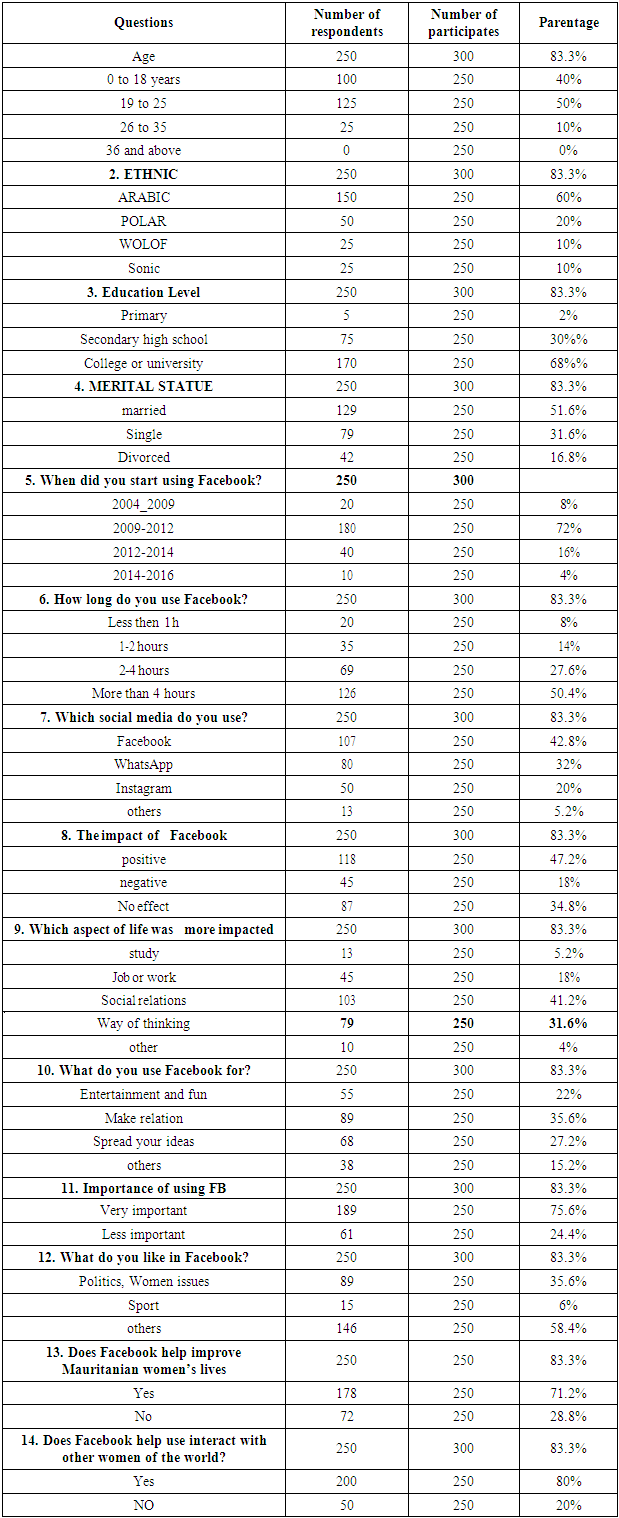 |
| |
|
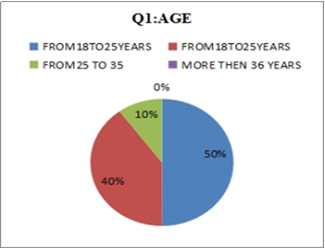 | Figure 1. Example of an image with acceptable resolution |
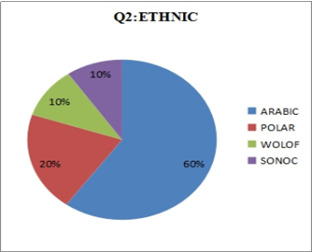 | Figure 2. Example of an image with acceptable resolution |
Facebook is designed to foster social interaction enhanced social network also provide rich information sources. We can conclude from this outcome of the graph that Facebook usage is dominated in Mauritania society among women. Of course, the purpose is exchange the idea between the world, to sum up Facebook has become widespread and influence in Mauritania societies even the conservative and the privacy life that Mauritania woman lived. On other hand the marital status of the participants Appeared that 52% of them married and 31% are single the other 17% were divorced. (Figure 3), we can conclude the female reported themselves to be more active in information seeking and contributing activities. we can say that since they are women there is only one way to express themselves and their ideas freely is to be online this confirm the claim that the internet in general and Facebook in particular are playing a very important role in empowering woman in Mauritania country also we can conclude from the survey we considered Facebook as venue for networking and seeking social supports.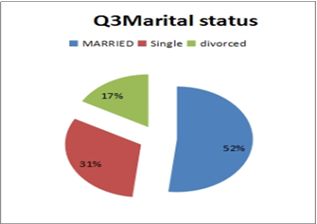 | Figure 3. Example of an image with acceptable resolution |
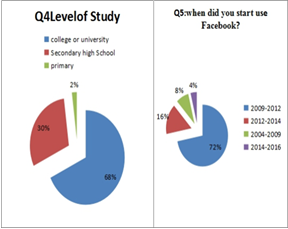 | Figure 4. Example of an image with acceptable resolution |
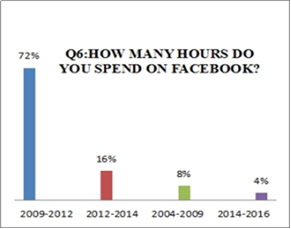 | Figure 5. Example of an image with acceptable resolution |
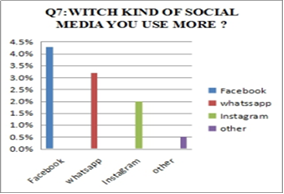 | Figure 6. Example of an image with acceptable resolution |
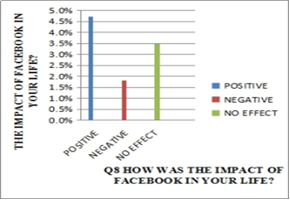 | Figure 7. Example of an image with acceptable resolution |
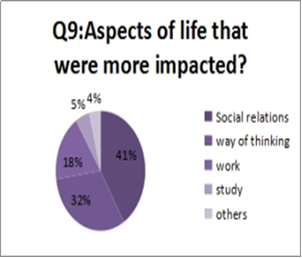 | Figure 8. Example of an image with acceptable resolution |
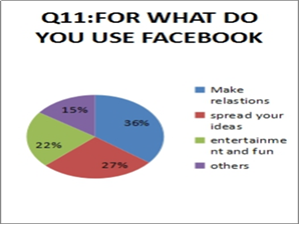 | Figure 9. Example of an image with acceptable resolution |
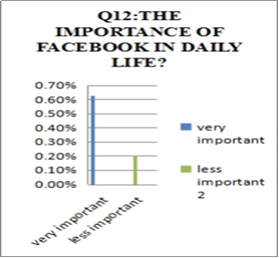 | Figure 10. Example of an image with acceptable resolution |
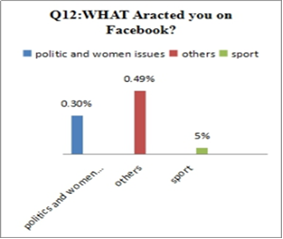 | Figure 11. Example of an image with acceptable resolution |
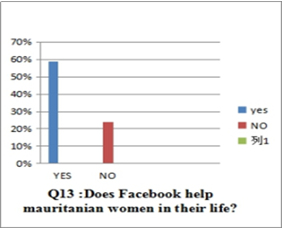 | Figure 12. Example of an image with acceptable resolution |
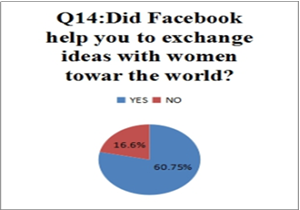 | Figure 13. Example of an image with acceptable resolution |
4.2. Other Information
This Includes 16 questions about how was the impact of Facebook in the Mauritanian daily life and what were the most benefits that they have got from using Facebook as platform for expressing their ideas and feelings.Table 2
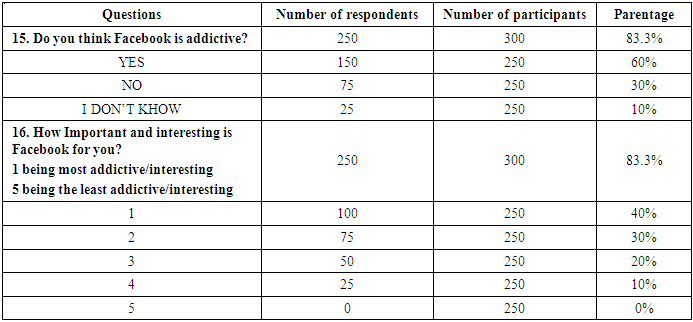 |
| |
|
The analysis of results in Group B “Table 2”, which includes questions on the impact of the use of Facebook on the Mauritanian woman's identity and the most important topics that attract the attention of Mauritanian women on Facebook have shown 60% of the participants in this study posts described themselves as addicted on Facebook and this, if it justified anything it will be the depth of influence Facebook has left on those women, what draws the attention was 40% of the participants classified entry to Facebook ranked first of the daily interests. Therefore, the answer to what was the main motivation behind the use of Facebook by those women has answered ratio of 51.6% they use Facebook. That grabs the attention of the others was the biggest reason that push them to use Facebook.In addition, the highlight of personal identity and expression of personal views were 31% from overall proportion of answers. The rest justified their motives behind the use of Facebook they look for entertainment and fun and communicate with friends around the world. 72% of the participants stressed the importance of pursuing their followers, opinions and comments of those followers on Facebook and comments, whether their reaction was negative or positive. The rate of 70% of the participants in this study replied that their pages on Facebook is a reflection of their true identity while 30% of them choose the answers “no” which means their pages are a fictional character. They use it to realize their desires.The following figures explain the results of the questioned from (15-21)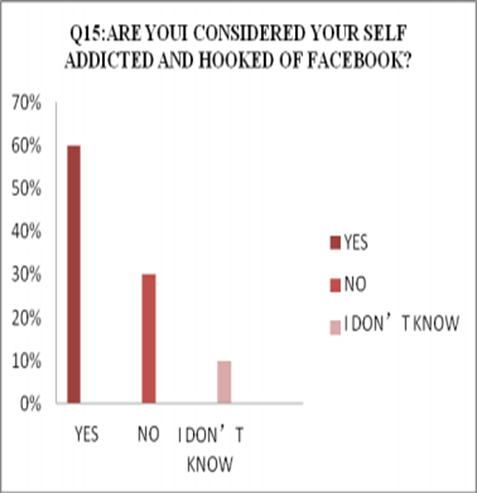 | Figure 14. Example of an image with acceptable resolution |
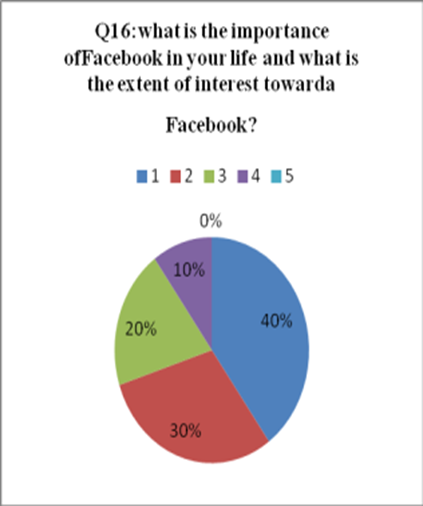 | Figure 15. Example of an image with acceptable resolution |
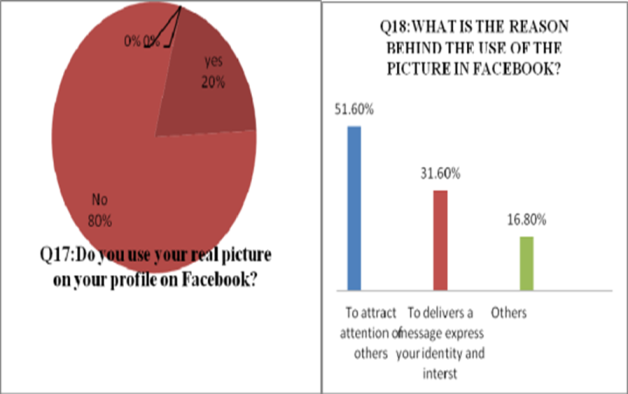 | Figure 16. Example of an image with acceptable resolution |
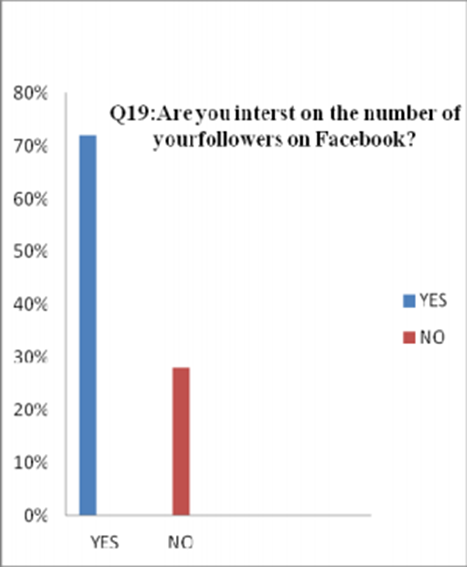 | Figure 17. Example of an image with acceptable resolution |
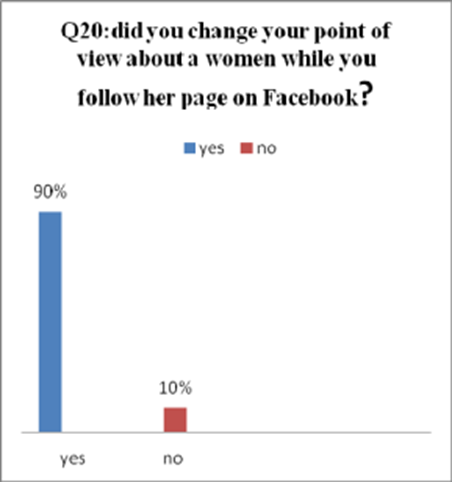 | Figure 18. Example of an image with acceptable resolution |
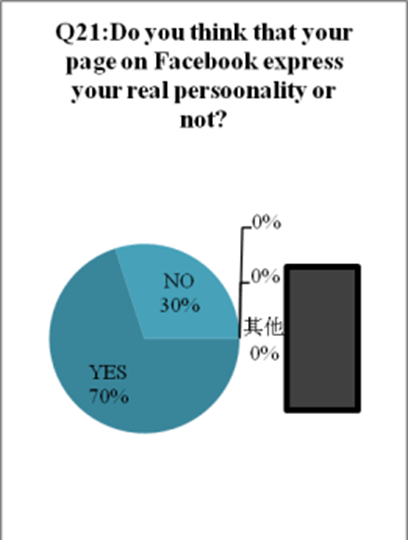 | Figure 19. Example of an image with acceptable resolution |
Table 3. Questions about What Mauritanians take as advantage or benefits from facebook
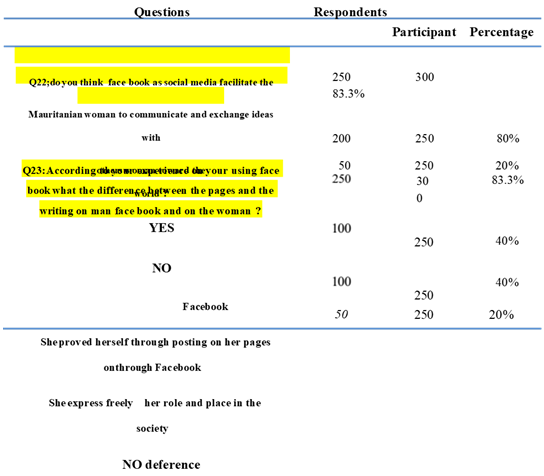 |
| |
|
5. Conclusions
The study shows Facebook pages are used in abundance by Mauritanian women mainly to put forward their own personal opinions regarding social, political, and personal issues in addition, to other topics that tackle religion, culture, women issues and other topics.Study main finding was Mauritanian women on Facebook discuss various issues around them through writing a novel stories and their own experiences that have a lot of reactions on the media between them and their readers that contribute to put visions and new ideas in the post Perhaps the electronic interaction between women and readers proves she was able to provide a new identity for herself, As the study shows, posting on Facebook has become one of the tools for self-expression for Mauritanian women to make their voices heard in society and the study found Facebook pages were the evolution of the traditional personal diary-notes for women it means these notes had changed from being a figure sits in a special book to a public electronic platform in which user can online read and interact with it, meaning that anyone has access to them to read and comment on. It complies with the American Sociological researcher Devi Riesman in His study and who sees people have changed from the traditional influence of the customs and traditions around them to receiving the influence from the inside of them by touching their own way. people are turning to receiving any influences from abroad as long as they have desire of satisfaction around them instead of satisfaction themselves and practice this result. This shall apply to women's blogs, Mauritanian women turned from being affected by the customs and traditions surrounding them which seeks to persuade them of being able to compete and participate in like any other Blogging men. Facebook was better to do both way because as it gave them a platform to compete and express themselves.At the end, this study presents a number of proposals which can be employed by decision-makers and communities to improve woman's condition in Mauritania. In addition to the social identity theory suggests in its assumptions, Mauritanian women on Facebook have created roles for themselves, so they play the role of thinkers and analysts, and these roles put forward an identity for them as people who have been engaged in different fields in society. By interpreting different symbols around them, women on Facebook tend to construct a new reality for themselves online. That is why Mauritanian women on Facebook which were under this study have more than one dimension of identity rather than just one. These roles, as thinkers and analysts have become an important part of their daily routine. Previous studies suggest that people searching for a particular identity tend to stick to the role they master, because roles place them in recognized and meaningful social positions.So, from the study finding the researcher had suggested to the Mauritanian Facebook female users of Facebook those suggestions:1. The need to raise awareness of the importance of Facebook sites and other social networking, through holding courses for workers in different state institutions, and inform them of ways that make optimum use of such sites, and the benefits of this usage.2. The need to Conduct prospective studies on other social networking sites, and various uses, and the motives of these uses and the benefits witch achieved them.3. The need to carry out studies similar to this study, on the various segments of society and indicate the positive and negative effects of the uses of these audiences to various social networking sites.4. The need for Dealing with various social networking sites as a fact, and the Mauritanian family and Arab family, especially the mother in the first place, to contribute the personal development conscious of her children, and make sure rationalize the use of any of these sites in the house, and the selection should be in line with the standards values of the Arab societies.
References
| [1] | Role of Social Media in the Empowerment of Arab Women by Maurice Odin (Global Media Journal Spring 2013 –). Publication details, including instructions for authors and subscription information: -http://www.tandfonline.com/loi/rfms20. |
| [2] | The first ladies and the Arab spring Elza Ibroscheva Published online: 11 Oct 2013. |
| [3] | Jabre, B., & Underwood, C. (2008). Enabling Women's Agency: Arab Women Speak Out. Retrieved March 19, 2010, from All Academic Arab Women Speak Out: Profiles of Self-Empowerment By 4-4-Bushra Jabre Carol Underwood Lauren Goldsmith November 1997. |
| [4] | Seib, P. (2009). New Media and the New Middle East. New York: Palgrave Macmillan. |
| [5] | Ulrich, B. (2009). Historicising Arab Blogs: Reflections on the Transmission of Ideas and. |
| [6] | Information in the Middle Eastern History. Retrieved October 1, 2010, from Arab. |
| [7] | Media and Society: http://www.arabmediasociety.com/articles/downloads/20090506150407_AMS8_Bri an_Ulrich.pdf. |
| [8] | Jones, S. (2008). Digitized: Women, Careers, and the New Media Age. Indiana: Ball State University. |
| [9] | wapong, O. (2009). Reaching the Unreached: ICTs and Adult Education for the Empowerment of Rural Women. Lanham: University Press of America. |
| [10] | http://www.dsg.ae/NEWSANDEVENTS/UpcomingEvents/ASMR_AWSM3.aspx. |
| [11] | Alexa.com 2010, The Top 500 Sites on the Web, viewed 1 September. |
| [12] | International Journal of Computer Science and Network Security, vol 9, no. 11, pp: 288-293. |
| [13] | Al-Saggaf Y 2003, Online Communities in Saudi Arabia: An Ethnographic Study, PhD thesis. |
| [14] | Charles Sturt University, Wagga Wagga, AUS Al-Saggaf Y 2006, 'The online public sphere in the. |
| [15] | Arab world: The war in Iraq on the Al Arabiya website', Journal of Computer-Mediated Communication, vol 12, no. 1, viewed 15 April 2008. |
| [16] | http://jcmc.indiana.edu/vol12/issue1/al-saggaf.html Al-Saggaf Y 2007, ‘The digital divide within the digital community in Saudi Arabia’, in E. Rooksby & J. Weckert (eds). |
| [17] | Information Technology and Social Justice, pp: 262-282. IGI, Hershey Al-Saggaf Y & Weckert J 2006, ‘Political Online Communities (POCs) in Saudi Arabia’, in S Marshall, W Taylor & X Yu (eds.). |
| [18] | Encyclopedia of Developing Regional Communities with ICT, pp: 557-563. IGI, Hershey Barnes R. E. Sorace, V. S. Reinhardt, and S. A. Vaughn, “High-speed digital-to-RF converter,” U.S. Patent 5 668 842, Sept. 16, 1997. |






















 Abstract
Abstract Reference
Reference Full-Text PDF
Full-Text PDF Full-text HTML
Full-text HTML

